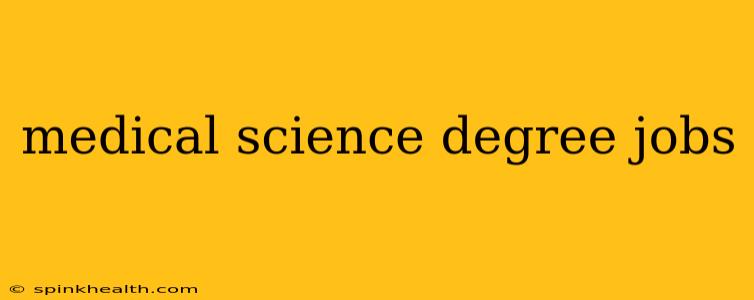A World of Opportunity: Exploring Careers with a Medical Science Degree
The journey of obtaining a medical science degree is rigorous, demanding dedication, perseverance, and a genuine passion for unraveling the complexities of human health. But the reward? A vast landscape of exciting and impactful career paths, each offering unique challenges and immense fulfillment. This isn't just about white coats and stethoscopes; it's about contributing to a healthier world in countless ways. Let's delve into the diverse options that await graduates with a medical science degree.
What are the career options after completing a medical science degree?
This is a question that echoes in the minds of many aspiring medical scientists. The answer, thankfully, is multifaceted. A medical science degree isn't a singular ticket to one specific job; it's a key that unlocks numerous doors. From the cutting-edge research labs to the bustling clinical settings, and even into the regulatory and policy arenas, graduates find their niche in various roles. Some directly apply their scientific knowledge in hands-on roles, while others utilize their analytical and problem-solving skills in support functions crucial to the medical field.
What kind of jobs can I get with a medical science degree?
Let's explore some specific career avenues:
1. Research Scientist: This is often the dream for many. Imagine contributing to groundbreaking discoveries, developing new treatments, and pushing the boundaries of medical knowledge. Research scientists design and conduct experiments, analyze data, and publish their findings. Specializations within this field are numerous, ranging from cancer research to neuroscience to infectious disease. The path typically involves further postgraduate studies, such as a PhD.
2. Clinical Research Associate (CRA): CRAs play a vital role in ensuring the integrity and ethical conduct of clinical trials. They monitor the progress of studies, collect data, and ensure compliance with regulations. It's a dynamic field involving significant travel and interaction with healthcare professionals.
3. Medical Writer/Editor: Excellent communication skills are crucial in science. Medical writers and editors translate complex scientific data into accessible formats for various audiences, including healthcare professionals, patients, and the public. This involves creating publications, grant proposals, and marketing materials.
4. Regulatory Affairs Specialist: The regulatory landscape of the pharmaceutical and medical device industries is complex. Regulatory affairs specialists ensure that products meet all legal and safety requirements before they can be marketed and sold.
5. Healthcare Consultant: Medical science graduates often find themselves advising healthcare organizations on various aspects of operations, strategy, and policy. This role demands strong analytical skills and a deep understanding of the healthcare system.
6. Data Scientist in Healthcare: With the explosion of data in healthcare, data scientists play a critical role in analyzing patient information, identifying trends, and informing healthcare decisions. This field demands strong analytical and programming skills.
7. Pharmacologist: This specialization focuses on the study of drugs and their effects on the body. Pharmacologists work in research, development, and testing of new medications.
8. Biotechnologist: Biotechnologists utilize biological systems to develop new technologies and products, often working in research and development within the biotechnology industry.
9. Laboratory Technician: These professionals work in laboratories performing tests, analyzing samples, and assisting researchers in their experiments. This is an entry-level role often pursued directly after an undergraduate degree.
What is the salary of a medical science graduate?
Salary expectations vary significantly depending on the specific job, experience level, location, and employer. While entry-level positions may offer a starting salary in a particular range, experienced professionals in specialized roles often command significantly higher compensation. Factors such as geographical location and the demand for specific skill sets play a critical role in shaping income potential.
Are medical science degrees in demand?
Yes, the demand for professionals with medical science degrees is generally high and consistently growing. The field is constantly evolving, requiring individuals with strong scientific backgrounds and critical thinking skills to tackle new challenges in healthcare and research. This robust demand ensures opportunities across a range of sectors.
What are the best medical science degrees?
The "best" medical science degree depends on your individual career aspirations and interests. Look for programs with strong research facilities, experienced faculty, and opportunities for hands-on experience. Accreditation and reputation are also important factors to consider. Research potential universities and their programs carefully to find the best fit for your goals.
This is just a glimpse into the exciting possibilities that await medical science graduates. The journey is demanding, but the rewards are immeasurable – a career dedicated to improving human health and making a real difference in the world. Remember to research specific job descriptions and requirements as you explore these diverse and rewarding options.

